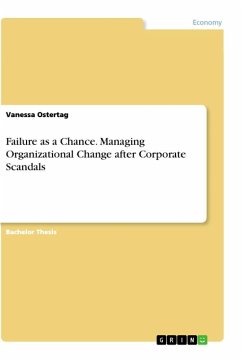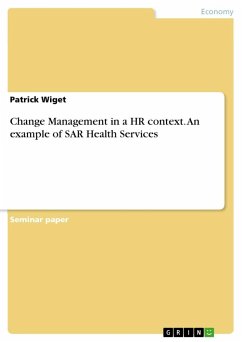Bachelor Thesis from the year 2014 in the subject Business economics - Business Management, Corporate Governance, grade: 1.0, LMU Munich, language: English, abstract: This paper deals with structural challenges arising for organizational change after corporate scandals. Corporate scandals have become an increased phenomenon and corresponding information spreads progressively fast in times of digital and social media. These can pose an extreme threat to organizations' legitimacy and reputation and thus, endanger their performance and survival chances. Nevertheless, there are still many examples of 'bad handling' and organizations seemingly do not know how to cope with such incidents correctly. The way organizations and their environments perceive and respond to a scandal constitutes a decisive factor concerning its outcome and consequences. Despite the extreme threat and inevitable harm that arise out of corporate scandals, they can be seen as triggering events that generate a chance for fundamental and beneficial organizational change. The corresponding literature on crisis management focuses on response strategies to improve perceptions of the organization. To substantially solve and permanently prevent the reoccurrence of such an incident, however, fundamental change in the organization's practices and behavior is necessary. This research question is addressed with an integrated approach to exploit both, knowledge from theory on crisis and change management as well as business practice and reality. In order to develop practical guidelines for organizations and to demonstrate how theoretically developed recommendations may look like and can be implemented in practical reality, this paper includes a case study. The theoretical approach is thereby enriched by an analysis of the Siemens AG after their bribery scandal in 2006. As result of the research, a framework is developed that should serve as a guideline for an effective handling of corporate scandals. Therein, implications from theory and practice are combined and both, the organization's direct response to the scandal as well as the management of the subsequent change, are considered. The main goal of this response and change effort is to recreate a perception of integrity to regain support both from the outside as well as from the organization's inside.
Hinweis: Dieser Artikel kann nur an eine deutsche Lieferadresse ausgeliefert werden.
Hinweis: Dieser Artikel kann nur an eine deutsche Lieferadresse ausgeliefert werden.








